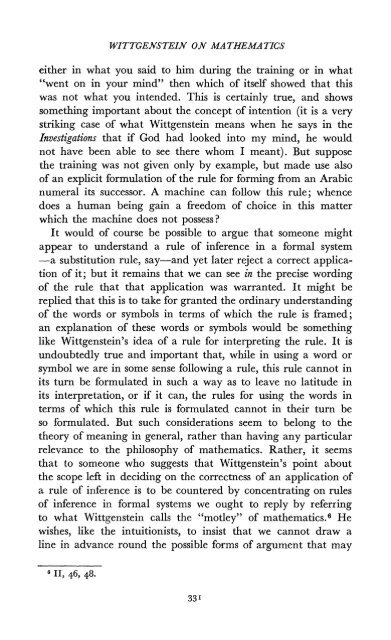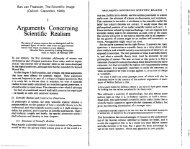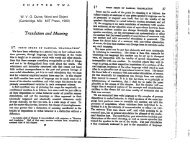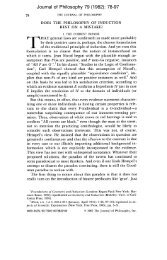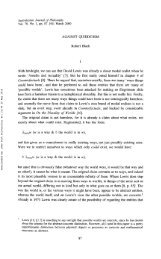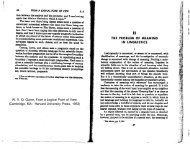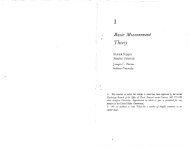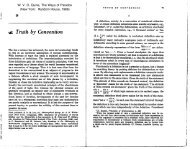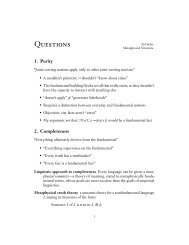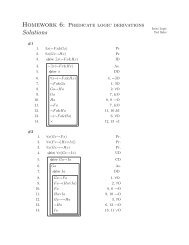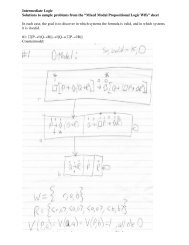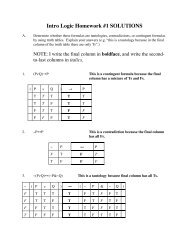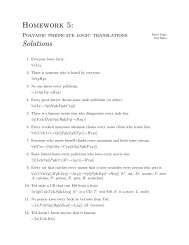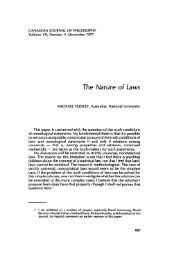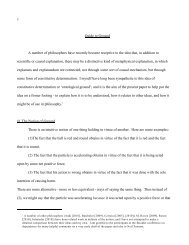Dummett - Wittgenstein's Philosophy of Mathematics.pdf - Ted Sider
Dummett - Wittgenstein's Philosophy of Mathematics.pdf - Ted Sider
Dummett - Wittgenstein's Philosophy of Mathematics.pdf - Ted Sider
Create successful ePaper yourself
Turn your PDF publications into a flip-book with our unique Google optimized e-Paper software.
WITTGENSTEIN ON MA THEMA TICS<br />
either in what you said to him during the training or in what<br />
''went on in your mind" then which <strong>of</strong> itself showed that this<br />
was not what you intended. This is certainly true, and shows<br />
something important about the concept <strong>of</strong> intention (it is a very<br />
striking case <strong>of</strong> what Wittgenstein means when he says in the<br />
Investigations that if God had looked into my mind, he would<br />
not have been able to see there whom I meant). But suppose<br />
the training was not given only by example, but made use also<br />
<strong>of</strong> an explicit formulation <strong>of</strong> the rule for forming from an Arabic<br />
numeral its successor. A machine can follow this rule; whence<br />
does a human being gain a freedom <strong>of</strong> choice in this matter<br />
which the machine does not possess?<br />
It would <strong>of</strong> course be possible to argue that someone might<br />
appear to understand a rule <strong>of</strong> inference in a formal system<br />
-a substitution rule, say-and yet later reject a correct applica-<br />
tion <strong>of</strong> it; but it remains that we can see in the precise wording<br />
<strong>of</strong> the rule that that application was warranted. It might be<br />
replied that this is to take for granted the ordinary understanding<br />
<strong>of</strong> the words or symbols in terms <strong>of</strong> which the rule is framed;<br />
an explanation <strong>of</strong> these words or symbols would be something<br />
like <strong>Wittgenstein's</strong> idea <strong>of</strong> a rule for interpreting the rule. It is<br />
undoubtedly true and important that, while in using a word or<br />
symbol we are in some sense following a rule, this rule cannot in<br />
its turn be formulated in such a way as to leave no latitude in<br />
its interpretation, or if it can, the rules for using the words in<br />
terms <strong>of</strong> which this rule is formulated cannot in their turn be<br />
so formulated. But such considerations seem to belong to the<br />
theory <strong>of</strong> meaning in general, rather than having any particular<br />
relevance to the philosophy <strong>of</strong> mathematics. Rather, it seems<br />
that to someone who suggests that <strong>Wittgenstein's</strong> point about<br />
the scope left in deciding on the correctness <strong>of</strong> an application <strong>of</strong><br />
a rule <strong>of</strong> inference is to be countered by concentrating on rules<br />
<strong>of</strong> inference in formal systems we ought to reply by referring<br />
to what Wittgenstein calls the "motley" <strong>of</strong> mathematics.6 He<br />
wishes, like the intuitionists, to insist that we cannot draw a<br />
line in advance round the possible forms <strong>of</strong> argument that may<br />
6 II, 46, 48.<br />
33I


